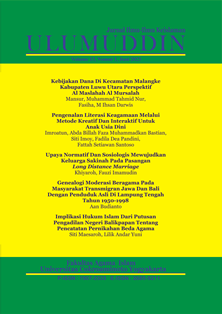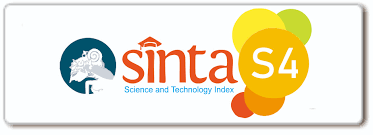Repetition In Educational Psychology: A Study Of The Qur’an Surah Ar-Rahman
DOI:
https://doi.org/10.47200/ulumuddin.v14i2.2614Keywords:
Repetition, Educational Psychology, Surah Ar-RahmanAbstract
Learning is a process of increasing knowledge. However, limited memory makes it easy for students to forget the material given by the teacher. Therefore, it is necessary to repeat the material to strengthen memory. The subject matter is repeated to recall and increase the understanding of the material that has been learned. The subject matter is repeated to recall and increase the understanding of the material that has been learned. Given the limitations of human memory that are easy to forget, the repetition of material is considered important to strengthen memory, as expressed in Surah Ar-Rahman. This study aims to describe the value of repetition in educational psychology. This research is a literature study with a qualitative approach, using maudhu'i (thematic) interpretation to analyse Surah Ar-Rahman. Repetition can increase a person's attention in the learning process, where generally individuals tend to imitate what others say. Through repetition, students will have a good and deep understanding.
Downloads
References
’Abdullah, ’Abdurrahman Shalih. (1990). Teori-Teori Pendidikan Berdasarkan Al-Qur’an (M. Arifin, Penerj.). Rineka Cipta.
Akbar, T. S. (2015). Manusia dan Pendidikan Menurut Pemikiran Ibn Khaldun dan John Dewey. Jurnal Ilmiah Didaktika, 15(2), 222–243. https://doi.org/10.22373/jid.v15i2.582
Ali, St. H. G. (2013). Prinsip-Prinsip Pembelajaran dan Implikasinya Terhadap Pendidik dan Peserta Didik. Jurnal Al-Ta’dib, 6(1), 31–42. http://dx.doi.org/10.31332/atdb.v6i1.288
Andergassen, M., Mödritscher, F., & Neumann, G. (2014). Practice and Repetition during Exam Preparation in Blended Learning Courses: Correlations with Learning Results. Journal of Learning Analytics, 1(1), 48–74. https://doi.org/10.18608/jla.2014.11.4
Atikah, D., & Rezki, A. (2018). Repetition Facilitates Retrieval Opportunity in Vocabulary Learning. IOP Conference Series: Earth and Environmental Science, 175, 1–6. https://doi.org/10.1088/1755-1315/175/1/012148
Badawi, A. A. (t.th.). Min Balaghah Al-Qur’an. Dâr al-Nahdhah li al-Haba’ wa an-Nasyr.
Baidan, N. (2002). Metode Penafsiran al-Qur’an: Kajian Kritis Terhadap Ayat-Ayat yang Beredaksi Mirip. Pustaka Pelajar.
Blades, D. (2020). Newsround: A Repetition. Canadian Journal of Science, Mathematics and Technology Education, 20(4), 780–783. https://doi.org/10.1007/s42330-020-00122-6
Brewin, C. R. (2018). Memory and Forgetting. Current Psychiatry Reports, 20(87), 1–8. https://doi.org/10.1007/s11920-018-0950-7
Büyükbay, S., & Dabaghi, A. (2010). The Effectiveness of Repetition as Corrective Feedback. Journal of Language Teaching and Research, 1(3), 181–193. https://doi.org/10.4304/jltr.1.3.181-193
Daradjat, Z. (1990). Kepribadian Guru. Bulan Bintang.
Departemen Pendidikan Nasional. (2007). Pedoman Pembelajaran Bidang Pengembangan Pembiasaan Di Taman Kanak-Kanak. Departemen Pendidikan Nasional.
English, M. C. W., & Visser, T. A. W. (2014). Exploring The Repetition Paradox: The Effects of Learning Context and Massed Repetition on Memory. Psychonomic Bulletin & Review, 21(4), 1026–1032. https://doi.org/10.3758/s13423-013-0566-1
Fahmi, M. (2002). Ad-Dalil al-Mufahras Li Alfaz al-Qur’an al-Karim. Dar as-Salam.
Faidal, N. F., Nur, R.-, & Suriani, S. (2020). The Teachers’ Pedagogic Competence in Teaching English through Online and Offline Setting. ELT Worldwide: Journal of English Language Teaching, 7(1), 41–53. https://doi.org/10.26858/eltww.v7i1.13294
Fauzan, A. (2017). Membaca Fenomena Shalat Sebagai Sebuah Tanda. Jurnal Dakwah dan Komunikasi STAIN Curup-Bengkulu, 2(1), 54–72.
Gunawan, H. (2014). Pendidikan Islam Kajian Teoritis dan Pemikiran Tokoh. Remaja Rosdakarya.
Hatip, M., Khoiriyah, Sanosra, A., & Qomariah, N. (2019). Competence, Professionalism, and Spiritual Intelligence of The Impact on Learning Motivation. IOSR Journal Of Humanities And Social Science (IOSR-JHSS), 24(2), 84–91. https://doi.org/10.9790/0837-2401108491
Hodge, D. R. (2004). Spirituality and People with Mental Illness: Developing Spiritual Competency in Assessment and Intervention. Families in Society: The Journal of Contemporary Social Services, 85(1), 36–44. https://doi.org/10.1606/1044-3894.257
Hodge, D. R. (2018). Spiritual Competence: What It Is, Why It Is Necessary, and How to Develop It. Journal of Ethnic & Cultural Diversity in Social Work, 27(2), 124–139. https://doi.org/10.1080/15313204.2016.1228093
Katsir, I. (2000). Tafsīr al-Qur‘ān al-’Aẓīm (Vol. 4). Muassasah Kordoba.
Kosim, M. (2015). Prinsip dan Strategi Pembelajaran Mengatasi Lupa Perspektif Psikologi Pendidikan Islam. Jurnal At-Tarbiyah, 6(1), 60–86. https://doi.org/10.31227/osf.io/hc5n2
Lukman, Marsigit, Istiyono, E., Kartowagiran, B., Retnawati, H., Kistoro, H. C. A., & Putranta, H. (2021). Effective teachers’ personality in strengthening character education. International Journal of Evaluation and Research in Education (IJERE), 10(2), 512–521. https://doi.org/10.11591/ijere.v10i2.21629
Madhavaram, S., & Laverie, D. A. (2010). Developing Pedagogical Competence: Issues and Implications for Marketing Education. Journal of Marketing Education, 32(2), 197–213. https://doi.org/10.1177/0273475309360162
Mahmud, M. D. (1990). Psikologi Pendidikan: Suatu Pendekatan Baru. BPFE.
Maliki, S. M. A. A.-. (2001). Keistimewaan-Keistimewaan Al-Qur’an (N. Fauzin, Penerj.). Mitra Pustaka.
Matthews, W. J., & Gheorghiu, A. I. (2016). Repetition, expectation, and the perception of time. Current Opinion in Behavioral Sciences, 8, 110–116. https://doi.org/10.1016/j.cobeha.2016.02.019
Miles, M. B., & Huberman, A. M. (2014). Analisis Data Kualitatif: Buku Sumber Tentang Metode-Metode Baru (T. R. Rohidi, Penerj.). UI Press.
Mulyasa. (2003). Menjadi Guru Profesional. Remaja Rosdakarya.
Mulyasa, E. (2011). Manajemen Pendidikan Karakter. Bumi Aksara.
Nahlawi, A. A.-. (1995). Pendidikan Islam di Rumah, Sekolah dan Masyarakat (S. Shihabuddin, Penerj.). Gema Insani Press.
Najati, M. U. (2010). Psikologi Qurani: Dari Jiwa Hingga Ilmu Laduni. Marja’.
Nasution, A. R., Sumarsih, S., & Saragih, A. (2018). Figures of Speech in Surah Ar-Rahman. LINGUISTIK TERAPAN, 15(1), 1–7. https://doi.org/10.24114/lt.v15i1.11270
Pahrudin, Martono, T., & Murtini, W. (2016). The Effect of Pedagogic Competency, Personality, Professional and Social Competency Teacher to Study Achievement of Economic Lesson in State Senior High School of East Lombok District Academic Year 2015/2016. Proceeding The 2nd International Conference On Teacher Training and Education Sebelas Maret University, 2(1), 332–345.
Parnawati, A., & Taridi, M. (2018). Teachers’ Social Competency in Improving Students’ Extracurricular Skills. Scholars Bulletin: An Official Publication of “Scholars Middle East Publishers” Dubai, United Arab Emirates, 751–158. https://doi.org/10.21276/sb.2018.4.8.7
Pudjono, M. (t.th.). Teori-Teori Kelupaan. Buletin Psikologi Fakultas Psikologi Universitas Gadjah Mada, 16(2), 89–93.
Quinn, M., & Hennessy, E. (2010). Peer Relationships Across the Preschool to School Transition. Early Education & Development, 21(6), 825–842. https://doi.org/10.1080/10409280903329013
Ramayulis. (2012). Metodologi Pendidikan Agama Islam. Kalam Mulia.
Rawson, K. A., & Dunlosky, J. (2011). Optimizing schedules of retrieval practice for durable and efficient learning: How much is enough? Journal of Experimental Psychology: General, 140(3), 283–302. https://doi.org/10.1037/a0023956
Rokhman, R. A., Tobroni, Nurhakim, Moh., & In’am, A. (2020). The Al-Fatihah Character: Aktualisasi Nilai-nilai Al-Fatihah sebagai Best Practice Pendidikan. Bildung.
Selvi, K. & Peter Lang. (2010). Teachers’ Competencies. Cultura International Journal of Philosophy of Culture and Axiology, 7(1), 167–175. https://doi.org/10.5840/cultura20107133
Shihab, M. Q. (1994). Membumikan Al-Qur’an. Mizan.
Shihab, M. Q. (1999). Fatwa-Fatwa. Mizan.
Shihab, M. Q. (2007). Mukjizat Al-Qur’an. Mizan.
Solso, R. L. (2001). Cognitive Psychology. Allyn and Bacon.
Syah, M. (2010). Psikologi Pendidikan Dengan Pendekatan Baru. Remaja Rosdakarya.
Tafsir, A. (2013). Metodologi Pengajaran Agama Islam. Remaja Rosdakarya.
Wahidah, S. W., Sukarti, S., & Qudsyi, H. (2011). Pengaruh Interferensi dan Rehearsal Terhadap Retensi Belajar Bahasa Inggris Pada Siswa Madrasah Tsanawiyah. Jurnal Intervensi Psikologi (JIP), 3(2), 257–273. https://doi.org/10.20885/intervensipsikologi.vol3.iss2.art7
Waters, E., & Sroufe, L. A. (1983). Social competence as a developmental construct. Developmental Review, 3(1), 79–97. https://doi.org/10.1016/0273-2297(83)90010-2
Wibowo. (2012). Menjadi Guru Berkarakter (Strategi Membangun Kompetensi dan Karakter Guru). Pustaka Pelajar.
Wirawan, I. G. N. (2019). Effect of Repetition Method on Teaching English Process in Classroom. International Journal of Social Sciences and Humanities, 3(3), 143–146. https://doi.org/10.29332/ijssh.v3n3.368
Woon, C. P., Yap, N. T., & Lim, H. W. (2020). Performance in nonword repetition tasks among mandarin-english bilingual children in Malaysia. Pertanika Journal of Social Sciences and Humanities, 28(4), 3125–3143. Scopus. https://doi.org/10.47836/PJSSH.28.4.35
Yunus, M., & Hasanah, U. (2020). Rahasia Pengulangan (Repitisi) Ayat Dalam Surah Ar-Rahman (Kajian Kitab Tafsir Ruh al-ma’ani Karya Al-Alusi). Jurnal al Irfani: Ilmu Al Qur’an dan Tafsir, 1(2), 1–19. https://doi.org/10.51700/irfani.v1i02
Yurisa, A. (2019). Correlation between Spiritual Competence and Self-Expression with Student Learning Behavior. Educare: International Journal for Educational Studies, 12(1), 69–76. https://doi.org/10.2121/edu-ijes.v12i1.1247.g1079
Zygmunt, E., Cipollone, K., Tancock, S., Clausen, J., Clark, P., & Mucherah, W. (2018). Loving Out Loud: Community Mentors, Teacher Candidates, and Transformational Learning Through a Pedagogy of Care and Connection. Journal of Teacher Education, 69(2), 127–139. https://doi.org/10.1177/0022487117751640
Downloads
Published
How to Cite
Issue
Section
License
Copyright (c) 2024 Eko Harianto, Muhammad Muhammad, Muhammad Anis, Aris Fauzan

This work is licensed under a Creative Commons Attribution-ShareAlike 4.0 International License.









